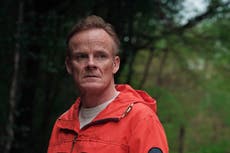Top Boy review: Bleak but cinematic vision of modern urban life smashes to a close on Netflix
The final season of the London-set hit pulls no punches, showing that a big American streamer can be trusted to tell Black, British stories
“We could’ve been anything that we wanted to be,” came the refrain in Alan Parker’s 1976 film Bugsy Malone, as four little boys, dressed as gangsters, strutted down the street. Perhaps, in the Seventies, the contrast of their youth and the implicit violence of the prohibition era could be easily played for laughs. But now, in 2023, as Netflix’s Top Boy returns for a six-part final series, the dreams and ambitions of young men, subsumed by needless violence, feels altogether more nightmarish.
The truce between Dushane (Ashley Walters) and Sully (Kane Robinson aka rapper Kano) has been the central relationship of Top Boy, even before it made the leap from Channel 4 to Netflix. Fragile at best, their cooperation has taken a serious blow: in the dying moments of the show’s penultimate series, Sully murdered his rival, Jamie (Micheal Ward), with whom Dushane had been doing business. And now Top Boy’s final season opens directly in the aftermath of that, as Dushane’s date with partner Shelley (Simbiatu Abisola Abiola aka rapper Little Simz) is interrupted by a text. “Jamie’s been dun,” it reads, succinctly.
Jamie’s death has multiple impacts. “I’m next, yeah?” asks Dushane. “Not if you step back,” Sully replies. But being Top Boy has its downsides, not least having to deal with the McGees, new players on the scene, whose penchant for violence makes Sully look like Top Toddler. The family’s psychotic nephew Jonny (Oscar-nominee Barry Keoghan) bends Sully to his will, and soon enough the thrill of running the game on the Summerhouse estate has given way to perpetual fear. And then there’s Stef (Araloyin Oshunremi), Jamie’s younger brother, who witnessed the assassination. Vengeance looms over his teenage head, like a dark cloud.
The number of great TV shows set in London is surprisingly small, at least compared to New York where they lurk on every street corner like hot dog vendors. Since its arrival in 2011, Top Boy has offered a distinctive vision of the city, one where rival pushers run the streets, at once both in conflict with and abetted by the middle-class forces that keep them down. The Hackney of Top Boy crackles with life (not unlike the Hackney of Hackney). And it provides a fitting backdrop for the increasingly fraught relations that govern the show’s twisted interpersonal politics. “I ain’t nothing f***ing like you,” Dushane tells Sully. “I’m loyal.”
But there is an inescapability to Northern Irish writer Ronan Bennett’s vision of London’s criminal underworld. Dushane is eating in fancy restaurants and spending millions on a nail shop chain, but a few scenes later he’s smashing someone’s head in. A drug-addicted young mother has her first good day in a long while, but, of course, she’ll drown in the bath that evening. Young love is blossoming only to be uprooted by violence. There is something inexorable about the way that this final season of Top Boy ends in civil unrest, gunfights and dead men. “We are not monsters,” Sully observes, tearfully. “We’re food.”
Your tolerance for this Rube Goldberg machine, of bad things happening, will depend on your investment in the human progress of Dushane, Sully and the rest of the crew. And attempts to crowbar in a contemporary political resonance (the Home Office is trying to send a Summerhouse resident on Dushane’s crew “back to Rwanda”) and expand the visual scale of proceedings (a shootout in a care home ends with a half-dozen bodies, an event that would presumably lead the national news for weeks) detract from the narrative realism. Top Boy takes itself seriously, but, in the end, it was never The Wire.
But then, what is? Bennett, along with his two lead actors, Walters and Robinson, has succeeded in creating a bleak but cinematic vision of modern urban life. This concluding chapter of the Top Boy saga pulls none of its punches – if anything it makes too many of them, like a rabbit-punching flyweight – and demonstrates that a big American streamer can be trusted to tell Black, British stories. Perhaps more so than our domestic broadcasters.
If you’re travelling abroad and want to watch Top Boy then you might need a VPN to unblock your streaming app. Our VPN roundup is here to help: get the best VPN deals on the market.
Join our commenting forum
Join thought-provoking conversations, follow other Independent readers and see their replies
Comments


Bookmark popover
Removed from bookmarks